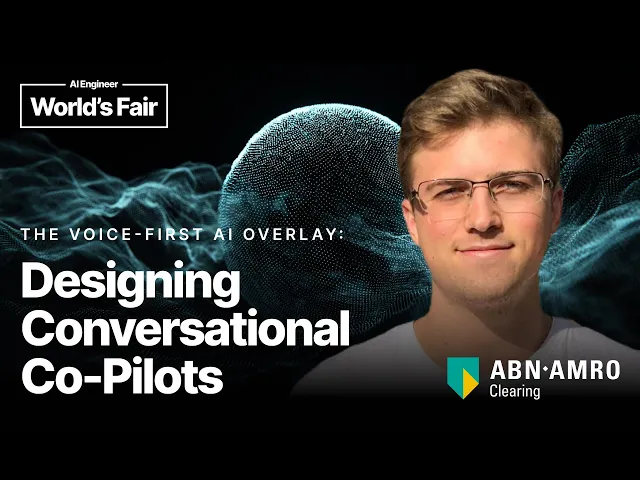The Voice-First AI Overlay: Designing Conversational Co-Pilots

Voice-first AI might make apps obsolete
In a recent YouTube presentation, Gregory Bruss of Microsoft shared a compelling vision for what he calls the "voice-first AI overlay" – a new paradigm that could fundamentally transform how we interact with technology. This isn't just another incremental update to voice assistants; it's a comprehensive rethinking of human-computer interaction that might eventually render traditional apps unnecessary.
The Voice-First Revolution
Bruss outlines a future where AI-powered conversational interfaces become the primary way we interact with computing systems, acting as co-pilots that help us navigate the digital world. This approach moves beyond the current paradigm of discrete applications toward a more unified, conversation-driven experience where the technical complexities are abstracted away from users.
-
The overlay concept eliminates app boundaries – Instead of forcing users to learn different interfaces for different applications, a voice-first AI layer works across contexts, handling transitions seamlessly while maintaining conversational continuity.
-
Language becomes the universal interface – Natural conversation replaces specialized UI knowledge, dramatically lowering barriers to technology use and potentially democratizing access to computing capabilities.
-
Attention and context management become key design challenges – As these systems evolve, developers must solve how to handle interruptions, maintain conversation history, and transition between different domains without overwhelming users.
-
Multi-modal interaction enhances voice capabilities – The most effective systems will blend voice with visual, textual and other inputs, selecting the right mode for each task while maintaining a coherent experience.
Why This Matters: The End of Apps As We Know Them
The most profound insight from Bruss's presentation isn't just about voice interfaces becoming more sophisticated – it's about the potential dismantling of the application paradigm that has dominated computing for decades.
When you stop to consider it, apps are fundamentally artificial constructs. They represent technical boundaries that force humans to adapt to computers rather than the other way around. The voice-first overlay flips this relationship, making technology conform to natural human communication patterns.
This shift has massive implications for the tech industry. Platform owners like Microsoft, Google, and Apple are racing to position themselves as the providers of these AI overlay systems. For Microsoft specifically, their Copilot strategy appears to be the early stages of this vision – starting with AI assistants embedde
Recent Videos
How To Earn MONEY With Images (No Bullsh*t)
Smart earnings from your image collection In today's digital economy, passive income streams have become increasingly accessible to creators with various skill sets. A recent YouTube video cuts through the hype to explore legitimate ways photographers, designers, and even casual smartphone users can monetize their image collections. The strategies outlined don't rely on unrealistic promises or complicated schemes—instead, they focus on established marketplaces with proven revenue potential for image creators. Key Points Stock photography platforms like Shutterstock, Adobe Stock, and Getty Images remain viable income sources when you understand their specific requirements and optimize your submissions accordingly. Specialized marketplaces focusing...
Oct 3, 2025New SHAPE SHIFTING AI Robot Is Freaking People Out
Liquid robots will change everything In the quiet labs of Carnegie Mellon University, scientists have created something that feels plucked from science fiction—a magnetic slime robot that can transform between liquid and solid states, slipping through tight spaces before reassembling on the other side. This technology, showcased in a recent YouTube video, represents a significant leap beyond traditional robotics into a realm where machines mimic not just animal movements, but their fundamental physical properties. While the internet might be buzzing with dystopian concerns about "shape-shifting terminators," the reality offers far more promising applications that could revolutionize medicine, rescue operations, and...
Oct 3, 2025How To Do Homeless AI Tiktok Trend (Tiktok Homeless AI Tutorial)
AI homeless trend raises ethical concerns In an era where social media trends evolve faster than we can comprehend them, TikTok's "homeless AI" trend has sparked both creative engagement and serious ethical questions. The trend, which involves using AI to transform ordinary photos into images depicting homelessness, has rapidly gained traction across the platform, with creators eagerly jumping on board to showcase their digital transformations. While the technical process is relatively straightforward, the implications of digitally "becoming homeless" for entertainment deserve careful consideration. The video tutorial provides a step-by-step guide on creating these AI-generated images, explaining how users can transform...
